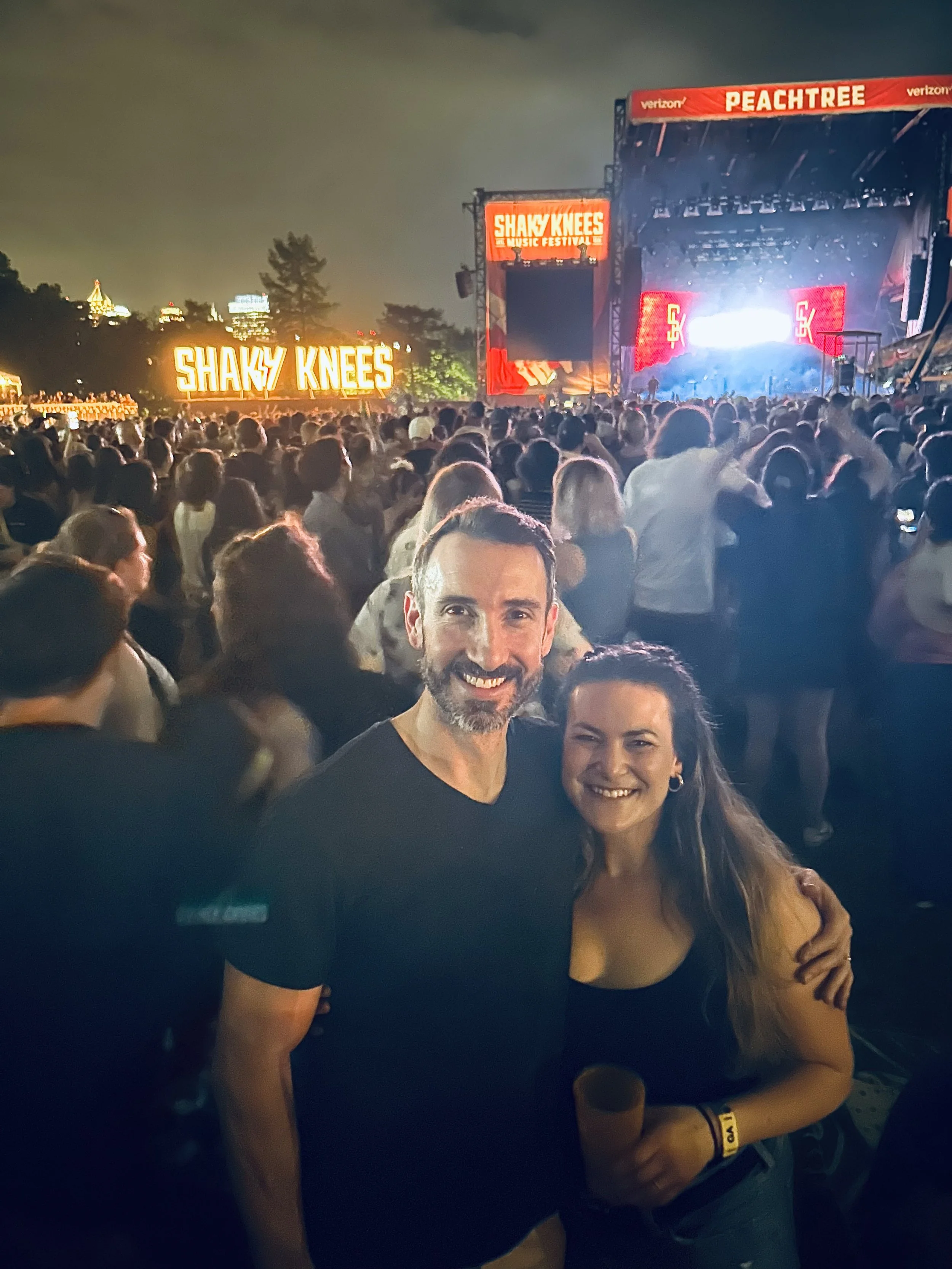Finding Balance: Navigating FOMO vs JOMO in your Marriage & Family Life
Daydreaming is something I find myself doing often. Mostly in the car while listening to music.
My daydreams consist of everything under the sun…from career opportunities, awards being won, how I want to feel and look, and even adventures I want to take with my husband and family.
Sometimes, I call this manifesting, which I do regularly around career opportunities or my hopes for life.
In other cases, my daydreams standstill.
The standstill dreams are typically around adventure and off-the-cuff yeses.
As I've aged, so has my anxiety and life load.
NYE Tokyo 2017
When Jarrod and I were younger, we adventured all the time— NYE in Tokyo, Snorkeling off the great barrier reef in Australia. We drank too much, rode scooters around Pacific Beach, went out on weekdays… and risked things more than I'd like to admit.
Although it may sound like I was a free bird— I wasn't. It took me almost a decade to get to Coachella. Everyone was going at 21/22 years old, and I was 29.
And it took me 3 days to actually relax in the setting.
I wouldn't call myself a scaredy cat, but there have been areas where I've been more reserved.
And then I graduated with a Ph.D., got pregnant, fell into a pandemic, had a baby, moved across the country, bought our first house, lost a family member, received an autism diagnosis, had another baby who came at 34 weeks, and had an emergency appendectomy, we put our soul dog down at only 6 years old due to cancer…
Newborn Photos September 2022
Life. Life happened in between going to Coachella and turning 36.
These events changed us.
They changed how we looked at life, how we spend money, how we plan our weeks, and how to best navigate parenthood.
It's taken us five years to agree on how best to support our family's well-being.
Part of that well-being is relying on routine and structure.
It's helped us understand who's roles and responsibilities are who's and helps us create security for our children.
But being so engrained in routine can also cause a rut!
Our brains crave novelty- trust me, I'm ADHD.
And…spontaneous action can be beneficial in your relationship.
Here are a few reasons why:
Keep things exciting!
Strengthens your connection
Encourages creativity
Promotes adaptability
Helps balance the routine you've built, aka rut
Strengthens your communication (more on this one below)
Doing the spontaneous thing can be challenging because we need to figure out what to expect.
Our brains are wired to figure it out before it's been figured out.
Most life expectations are based on other people's wants and desires. Because we live in a social media world, our brains are trained to tell us what is "right" and what to expect.
Enter FOMO.
Also known as Fear Of Missing Out -- the grass is greener on the other side.
Sometimes, we do things because we feel like we HAVE, SHOULD, or NEED to.
FOMO is defined as worrying about being absent from a social event, overlooking a rewarding social experience, and feeling that others have a more rewarding social experience than their own.
So, sometimes, we are invited to birthday dinners, children's parties, and other social events and go even though we don't want to.
Whether our social battery is depleted, our health needs rest, or we have other plans, FOMO wins.
This can impact decisions we make regarding spontaneous action.
There is only so much time in the day, week, month, or year — how do you want to spend your time?
Getting in touch with your values can be super helpful with learning how to say no and prioritize the activities that are important to you— including spontaneous ones!
For example, Jarrod and I did something spontaneous two weeks ago and got out of our rut.
Shaky Knees Music Festival
We were invited at the last minute to see Noah Kahan at The Shaky Knees Music Festival in the city…and we went.
Why? Music, especially live music and festivals, is something we sincerely appreciate and enjoy experiencing together.
My husband and I have a long music history, whether that is him singing and making it on to American Idol, dancing the night away at bars in Newport Beach in our early twenties, live music events, and, of course, music festivals.
So we did something new!
We also took the train into the city, which we'd never done before, and danced in a field while listening to fantastic music.
In the moment, the decision was unnerving. Why? Because I have more to lose now. #themotherhoodmentalload
And secondly, the decision we made was going to impact the rest of the weekend.
And it did.
We aren't those late-twenties kids with no kids of our own. Making a decision like this will create an avalanche of changes.
The next day, we were exhausted, so it was hard to be motivated to do what we needed. We had disagreements because we were easily frustrated.
And still, I encourage you to do spontaneous things with your spouse, using the advice I share below.
In our most recent podcast episode, Setting Boundaries, Prioritizing Your Relationship, Navigating Spontaneity: A Parent's Guide, we discussed our experience, what happened, what occurred after, and how we repaired it.
The biggest takeaway from our conversation was that prioritizing your marriage when you have children is essential for connection.
In addition, you should set boundaries and say no to certain activities that impede your relationship and your family's values.
We also discussed how going out looks differently today than it once did.
We used to not communicate about drinking or how late we would be out, and now we do.
We initially felt that communicating about schedules, planned physical intimacy, & spending was unnecessary and, honestly, not fun.
But, we learned with time that the less we communicated about our needs, frustrations, and experiences, the more we'd be resentful and frustrated with the other person
Setting Boundaries & Saying No:
We all have 4 buckets: individual, relationship with your spouse, relationships with your children, and relationships with others.
And let's face it- there is only a little time.
Each person may have a different top bucket (e.g., your partner may value social events more than you do, where you put the kids first).
After outlining your buckets, getting to know your partners is essential.
Here are 4 steps to help prioritize your relationship set boundaries while also still being spontaneous in your marriage:
To understand what bucket your partner prioritizes, you must *drumroll please* ASK THEM!
The first step in creating a partnership around prioritizing your marriage is communication. Determine what matters most to you and your family. This could include your individual time, getting outside, and having pizza night every Friday.
The second step is communicating these boundaries with external forces: invited to a birthday party but knowing it will be overstimulating for the family? Say no!
Third, set limits. In the podcast episode, I share how frustrating it used to be when Jarrod would go out and drink too much or not be on the same page about what time we wanted to leave. Even further, we've decided as a family that 1 event a weekend is the most doable for our energy and desires within this season in life.
It only sometimes happens this way, but we try!
It's challenging to say no. I struggle with this a lot. I worry about FOMO and I worry about being invited again, but most of the time, I didn't want to go and forced myself to go—I knew better.
The fourth step is to plan accordingly. If you do choose to do something spontaneous, look at how the decision impacts the rest of the weekend. For example, going out randomly? Who's getting up with the kids? If you work together like my husband and I do, when will the work be done that was scheduled for the time we chose to do something else?
This is important because knowing ahead of time can help ease tension and frustrations in the moment.
Earlier in the article, I shared about the phrase FOMO. The opposite of FOMO is JOMO!
Joy of Missing Out.
Getting in touch with your buckets, communicating with your partner to get on the same page, and saying no to things that don't align with your value system will all help you live in joy rather than fear.
Finding Balance
Navigating between routine and spontaneity as a parent takes work. It's a dynamic process that takes communication and compassion. While routines and boundaries are essential for stability and security, embracing spontaneous action can shake things up and bring excitement.
The most important part of navigating these polar opposites is openly communicating with our partners and being aware of how our decisions impact our "real" life and our well-being.
Lastly, saying no and setting boundaries creates more joy and freedom than accepting and attending events because you "should" or feel obligated to.
Let's embrace the joy of missing out on the events that don't serve us and find joy in the moments that make life memorable and meaningful.




